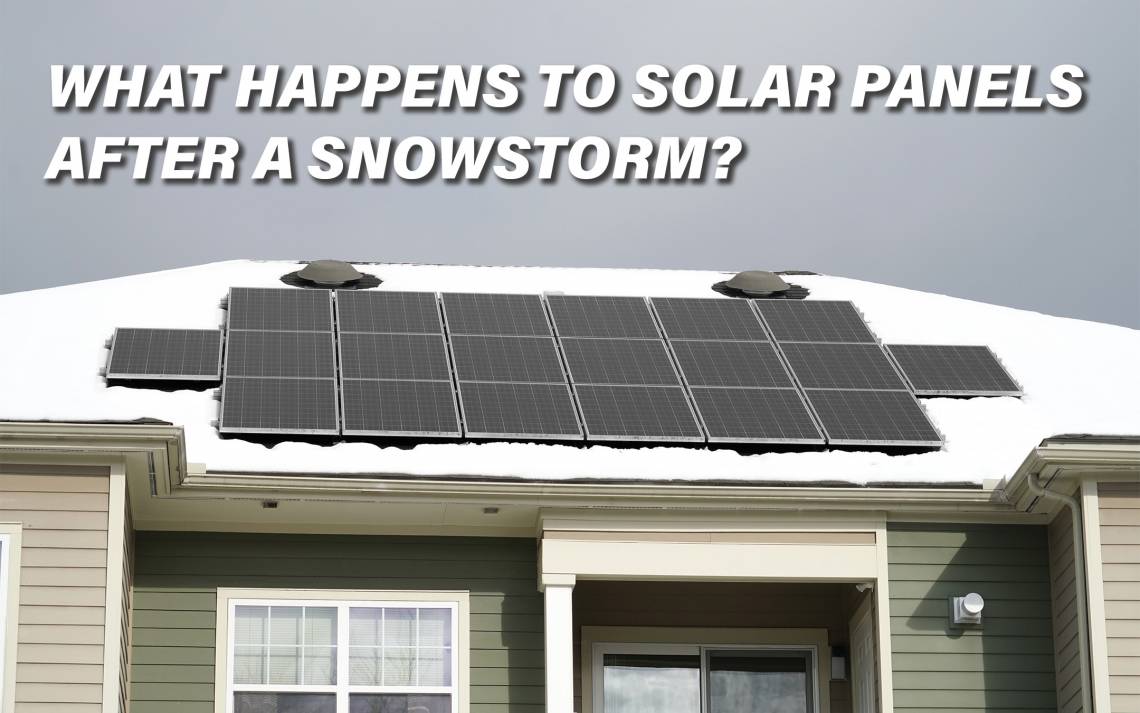
Can Solar Panels Withstand Winter Weather and Snowfall?
With snow storms hitting all over the United States this winter, you may be wondering how your solar panel system holds up during weather events like this. You shovel your driveway and get the snow off your car, but what about your solar panels? Do you need to be worried about the condition of your modules? Will productivity go down?
Well, as long as your solar panel system has been professionally installed, your array is built to handle circumstances like this.
Let me explain...
It’s not really worth it to clean them yourself
First of all, we do not recommend that you clean snow off your solar panels. The risk of injury to oneself or damage to your panels is not worth the small benefit. Your array is likely to be snow-free in a day or two, and any loss in production will likely be covered by production during those long summer days.
Some people choose to take control of the situation by getting a solar panel snow rake or similar tool made for solar panel snow removal that won’t damage the panels. However, most of the time, your panels will do all the snow removal work for you.
Snow on your panels will affect production, but not for long
When a solar panel is covered by a thick enough layer of snow, it’s blocked from sunlight, and therefore cannot generate energy. But that shouldn’t scare you, because it won't last long. In the larger picture of your energy savings, snow has an insignificant effect on your solar production.
Plus, your panels melt snow super quickly, as I’ll explain later, meaning they’ll be back to full production quicker than you think.
You don’t need to worry about less energy generation during the winter
When it comes to overall solar energy generation, winter days don’t matter nearly as much as summer days. This is because of net metering.
During summer daylight hours, solar produces more electricity than your property uses. When this excess electricity is sent back to the utility grid, you can be compensated for the excess electricity, as long as your utility supports net metering.
This means that you don’t need to rely just on your everyday energy production to offset your electricity costs. Some days will bring way more savings that can help you pay for the electricity you use when your panels aren’t producing as much, such after a snowstorm!
Panels are built to rid themselves of snow
In order to maximize sun exposure, solar arrays are mounted on your roof at an optimal angle facing the sun. With the steep angle and smooth glass surface of the solar panels, snow just can’t stick for too long before it slides off.
Another aspect that makes it hard for snow to stick around on your solar array is heat. The dark silicone cells of solar modules are specifically designed to absorb heat from sunlight. Once any portion of a panel is exposed to the sun, a small amount of heat spreads throughout the panel and melts the snow. Just like a blacktop driveway, once a break in the snow becomes exposed to the sun, it quickly grows. Once a bit of your array is clear and absorbing sunlight, the rest will follow.
Thanks to array design and installation, snow on panels rarely lasts for more than a few days. You’ll even see solar panels completely snow-free while the rest of the roof is still covered in snow.
Winter weather can actually be good for your modules
While the summer months offer more sunlight than the winter months, winter months are actually good for solar energy production. Cold, sunny weather is good for panels, as long as your panels aren’t covered by snow. Like most electronics, solar panels function more efficiently in cold conditions than in hot. This means that your panels will produce more power for each precious hour of sunshine during the short days of winter.
In addition, snow actually provides a convenient cleaning service when it melts off your panels. In drier parts of the United States, dust and dirt can build up on the surface of panels. This buildup can affect a solar array’s efficiency, meaning less production. Solar array owners in these areas are often forced to have their arrays washed to retain efficiency.
Fun Fact: Solar panels can convert any type of sunlight into electricity, which means light that’s reflected from snow to your array can help lower your electric bill even more.
Let it snow!
The next time you wake up to find a layer of snow on your solar array, don’t sweat the small loss in production. Think of the free cleaning it will be providing your panels, and remember that it will melt away and slide off before you know it!
By now you know that winter has no chance against solar panels, making anytime the best time to go solar.
If you’re interested in getting a free solar estimate and learning more about the benefits of solar power, contact us today! https://www.greensolartechnologies.com/solar-quote
